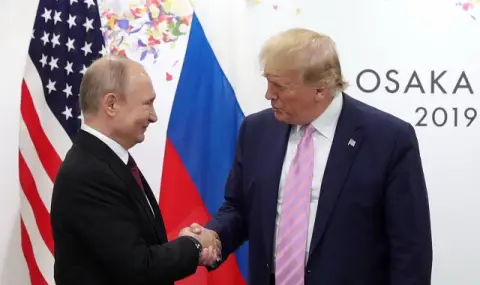They have all suffered from the Kremlin's imperial policy: the countries of Central and Southeastern Europe see Trump's behavior towards Ukraine as a betrayal. They fear being left in Russia's orbit again.
The verbal attacks of US President Donald Trump and his slander against Ukraine and its President Volodymyr Zelensky understandably cause consternation and genuine shock, especially among the people of the attacked country. But in the countries of Central and Southeastern Europe, too, fear is beginning to spread that they will once again be left to Russia.
Like Ukraine, almost all peoples and nations in the region have suffered from the imperial policy of Russia and later the Soviet Union - an old trauma that, however, is still not understood in Western Europe.
Therefore, Trump's approach, perceived as a betrayal towards Ukraine, is causing the deepest crisis of confidence in these countries since the 1980s, when it was initially not entirely clear how the Soviet Union would react to the movements for freedom and independence in the region. Since the late 1990s, the United States has been the most important guarantor of the security of Central and Southeastern Europe in NATO. And now the countries there are worried that they will be left to their own devices, as is Ukraine.
The greatest anxiety is felt among the political leadership of Romania. The head of the presidential office, Cristian Diaconescu, accuses Russia of proposing a "new Yalta" and the withdrawal of US troops from Romania during the Riyadh negotiations.
Prominent Romanian intellectuals, such as political scientist Vladimir Tismaneanu, define the Riyadh meeting as a "betrayal" towards Ukraine and Western values and see in it the danger of a "new Munich". At the Munich Conference in September 1938, the German Reich, France, Italy and Great Britain, without the participation of Czechoslovakia, decided that the Sudetenland, then part of Czechoslovakia, would be handed over to the German Reich.
Musk supports Romanian right-wing extremists
The reason for the sharp reactions is understandable: as in the case of Ukraine, the US government accuses Romania of being an undemocratic country. Vice President J.D. Vance said at the Munich Security Conference that Romania had not acted democratically by canceling the presidential election.
Technology billionaire Elon Musk, close to Trump, supports right-wing extremist and pro-Russian presidential candidate Calin Georgescu, who advocates the liquidation of the Ukrainian state and its division between Russia, Hungary and Romania. Earlier this week, Musk praised Georgescu on the X platform - writing “Romania deserves its sovereignty”.
”Sovereignists” are against Romania's right to defend itself
Romania is the most important military base for the US and NATO in Southeast Europe, and its territory also hosts the key missile shield for protecting the region from ballistic missile attacks. On the other hand, Romania, along with Moldova, is also a direct victim of Russia's war against Ukraine: More and more Russian drones are falling or exploding on Romanian and Moldovan territory. And the airspace of both countries is constantly violated by Russian missiles.
On Wednesday, February 19, Romania adopted a law that allows the shooting down of this type of drones. The three right-wing extremist parliamentary parties, which in terms of propaganda are served by the concept of “national sovereignty”, voted against the law.
Romania's interim president, Ilie Boloian, for his part, linked Romania's fate to that of Ukraine: “We are on Ukraine's side not only for humanitarian reasons, but also because it is of strategic interest to our country”.
Tusk's dramatic messages
The leaders of other Central and Southeastern European countries are also reacting with declarations of solidarity with Ukraine. Polish Prime Minister Donald Tusk appears on the X platform almost daily with dramatic appeals. Regarding Trump's negotiations with Russia, he wrote that the forced surrender of Ukraine would mean the surrender of the entire Western community.
Czech President Petr Pavel said it was cynical to compare Ukrainian President Zelensky to a dictator, while his Lithuanian counterpart Gitanas Nauseda called for urgent action to support and strengthen security in Europe. In this regard, he presented a six-point plan, which includes even tougher sanctions on Russia and investment in the Ukrainian arms industry. Other countries in the region are also calling for more investment in common European defense.
Three countries oppose support for Ukraine
The attitude of the political leaderships in Bulgaria, Slovakia and Hungary is different. Pro-Russian President Rumen Radev, who is not as loyal to the Kremlin as Viktor Orbán, constantly downplays Russian aggression and declares himself against support for Ukraine.
Radev cautiously welcomed Trump's "peace initiative" and called on the government and parliament to adopt resolutions against sending Bulgarian soldiers to Ukraine - a topic that is not relevant for either Bulgaria or the EU.
So far, Bulgarian governments have consistently provided military assistance to Ukraine. But it is unclear what position the government, which took office in mid-January, will take in the future, as two of its three constituent parties have pro-Russian or isolationist positions and the cabinet is not united on issues related to Ukraine.
In the cases of Slovakia and Hungary, it should be clear that they in no way support initiatives for solidarity with Ukraine or initiatives for better autonomous European defense. Slovak Prime Minister Robert Fico said unequivocally that his country has no business at meetings like the one in Paris. "Friends of war" met there, and Fico "had nothing to do with it."
